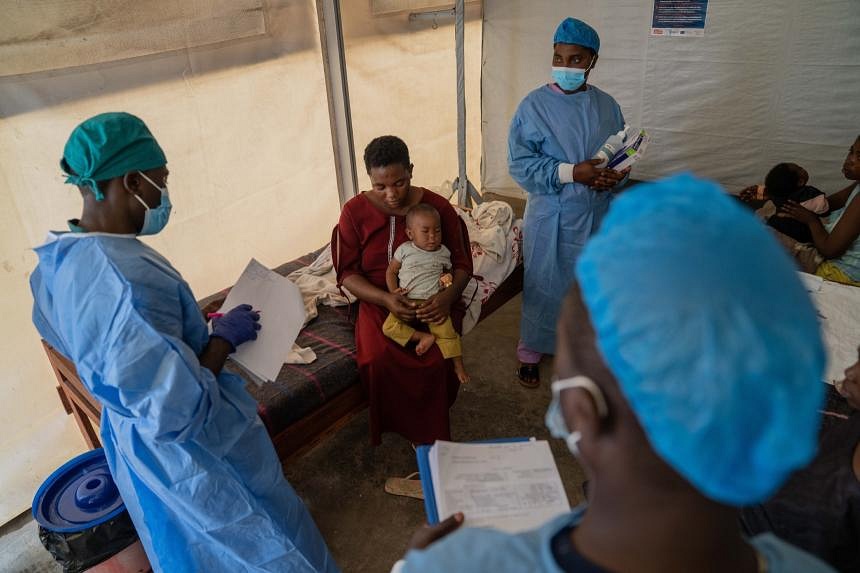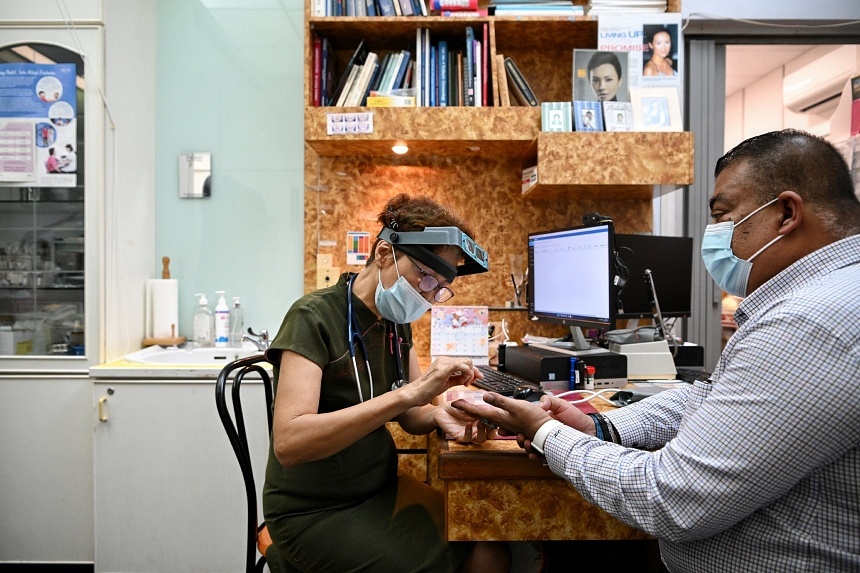from straitstimes.com:
Mpox situation in Africa ‘very worrying’, virus expected to arrive in S’pore: Ong Ye Kung
The virus, which has seen a rapid surge in several African countries, is expected to spread to the Middle East and Europe. PHOTO: EPA-EFE
Christine Tan
UPDATED
AUG 17, 2024, 10:02 PM
FacebookTelegram
SINGAPORE – The mpox outbreak in Africa and other places is “very worrying”, and Singapore should expect the virus to arrive at its shores.
Giving an update on Aug 17, Health Minister Ong Ye Kung said the current risk of an outbreak in Asia and Singapore from Africa is low as there are no direct flights to the affected areas in the continent. However, the virus, which has seen a rapid surge in several African countries, is expected to spread to the Middle East and Europe which Singapore has flight connections to.
“I would say, in general, this is a very worrying situation, especially for the African continent. But I think we should work on the basis that mpox will arrive in Asia. And probably, Singapore will be one of the first places to find cases because of our flight connections (to Middle East and Europe),” said Mr Ong, who was speaking on the sidelines of a skills and career fair in Bukit Canberra, Sembawang.
“This is something worrying. We should be on alert. We should expect it to arrive in Singapore, and then when it does, respond appropriately and effectively.”
Mpox, formerly known as monkeypox, causes flu-like symptoms and pus-filled lesions on the body. A new sub-variant – clade I – has alarmed global health experts due to its ability to spread easily through close, personal contact.
The World Health Organisation (WHO) on Aug 14
declared mpox a global public health emergency for the second time in two years.
The current outbreak in the Democratic Republic of Congo (DRC) has seen 27,000 cases and more than 1,100 deaths since January 2023, largely among children.
WHO director-general Dr Tedros Adhanom Ghebreyesus said the emergence of a new clade of mpox, its rapid spread in eastern DRC, and the reporting of cases in several neighbouring countries are “very worrying”.
In the past month, more than 100 laboratory-confirmed cases of the new sub-variant have been reported in four countries neighbouring the DRC that have not reported mpox before: Burundi, Kenya, Rwanda and Uganda.
Citing experts, WHO said the true number of cases may be higher as a large proportion of clinically compatible cases have not been tested.
It added that several outbreaks of different clades of mpox have occurred in various countries, with different modes of transmission and levels of risk.
Following the outbreak in the DRC and surrounding countries, Sweden on Aug 15 announced its first case of mpox caused by the clade I variant.
To date, all infections detected in Singapore have been the milder clade II ones, mostly during the 2022-23 global outbreak. There were 32 cases here in 2023, and 18 in 2022 from the time reporting of the disease started at end June that year.
The Republic has had 12 cases of mpox since January 2024, which the Ministry of Health (MOH) confirmed were from the clade II variant.
Mr Ong said when mpox spreads here, Singapore has to consider a few parameters to understand what it is dealing with.
First, there is a need to understand the virus’ severity rate. He noted that clade II has a fairly low fatality rate of 0.2 per cent – meaning for every 1,000 people who are infected, there are two deaths.
He added that the fatality rate of the clade I variant is about 3.5 per cent to 4 per cent, while the clade 1b variant has a fatality rate of 0.7 per cent.
Health Minister Ong Ye Kung said on Aug 17 that Singapore should be on alert for mpox cases. ST PHOTO: CHONG JUN LIANG
Mr Ong said the fatality rate should not be taken lightly. When the Covid-19 pandemic first broke, its fatality rate was 4 per cent before vaccinations.
“Of course, these are numbers recorded from Africa... Africa has many healthcare challenges. (When mpox comes) to Singapore, with our healthcare system and our ability to treat the cases, we hope we can bring it (fatality rate) down significantly,” he added.
Second, Mr Ong said there is a need to observe who the virus affects.
He highlighted that mpox appears to affect children, adding that in Africa, where children are not vaccinated against smallpox, a “disproportionate number of children below 15” have been infected with the virus.
Lastly, there is a need to understand the virus’ transmissibility and mode of transmission.
The clade II variant was mostly transmitted among people engaged in high-risk sexual activities, while the clade I variant spreads among close contacts.
Mr Ong said: “On the other hand, there is no evidence to show that it is spreading like Covid-19, where it can spread far and wide through airborne particles.”
He added that MOH is monitoring the situation closely as mpox spreads to other countries, but added that Singaporeans should also be aware of the situation and keep themselves healthy.
“If you are healthy, you are less likely to be affected by all these diseases. It was the case for Covid-19 as well. Likewise, it will be the same for mpox,” he said.
MOH said on Aug 15 that Singapore’s healthcare system has the capability to effectively diagnose and manage mpox infections.
It has informed all medical practitioners and healthcare institutions to be vigilant in detecting and reporting all mpox cases, including those suspected to be clade I infections.
To reduce spread, close contacts of confirmed cases will be quarantined and monitored for up to 21 days from the date of last exposure.

 Build up capacity to tackle key issues such as malnutrition, lack of vaccination coverage.
Build up capacity to tackle key issues such as malnutrition, lack of vaccination coverage. Facilitate development, approval and access to new drugs and medical devices. To do this, we can better coordinate clinical trials throughout the region.
Facilitate development, approval and access to new drugs and medical devices. To do this, we can better coordinate clinical trials throughout the region. Work together towards greater pandemic preparedness. Two key aspects of this: pandemic surveillance and vaccine production. These are essential to better prepare ourselves for the next pandemic.
Work together towards greater pandemic preparedness. Two key aspects of this: pandemic surveillance and vaccine production. These are essential to better prepare ourselves for the next pandemic. Antimicrobial Resistance has become a significant and looming threat. It means the emergence of bacteria that is resistance to antibiotics. The main problem is the inappropriate and liberal usage of antibiotics, and we need stronger regulations and enforcement against this.
Antimicrobial Resistance has become a significant and looming threat. It means the emergence of bacteria that is resistance to antibiotics. The main problem is the inappropriate and liberal usage of antibiotics, and we need stronger regulations and enforcement against this.



































































